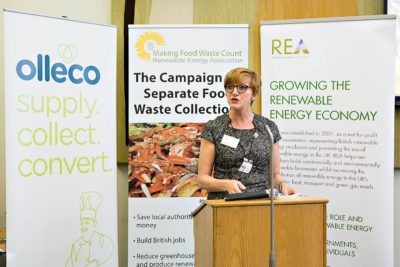The CCC released its annual report yesterday (28 June) on the government’s progress on climate change. In the section on waste, the body highlighted the growing EfW sector as a concern, calling for a moratorium on news plants and saying emissions from the plants are “undermining efforts to reduce emissions within the waste sector”.
The committee also said changes to recycling systems and packaging have the potential to boost recycling rates and reduce waste sent to incineration and landfill, but expressed frustration at the slow pace of this. The body also said it is crucial to implement “stronger policies and signals” to limit the expansion of waste-to-energy facilities, divert biodegradable waste away from landfills, and prioritise waste prevention.
EfW
Unsurprisingly, the report’s findings were welcomed by the national coordinator of the UK Without Incineration Network, Shlomo Dowen, who said: “Scotland took the wise step of putting a pause on approving incinerator planning applications while they considered the evidence.
“Both Scotland and Wales now have permanent incinerator moratoriums in place. For the sake of the climate and the circular economy the UK Government must follow suit by immediately issuing a similar moratorium for England in line with the CCC’s recommendations. Without such a halt, by the time the Government decides that a permanent moratorium is necessary it may already be too late to stop the wave of planning applications currently going through the planning system”.
Decarbonisation
The report detailed the need for “greater strategic coordination of plans to decarbonise the waste sector” and empathised the need for greater waste reduction policy. It called on Defra to publish a detailed plan to decarbonise the waste sector.
Responding to the report, Mike Maudsley, the chief of enfinium said: “We strongly support the Climate Change Committee’s call to rapidly decarbonise the waste sector. Every year at our four decarbonisation hubs across the UK, enfinium transforms over two million tonnes of unrecyclable waste that generate reliable, homegrown electricity. In doing so we also avoid 500,000 tonnes of carbon emissions entering the atmosphere.”
Mr Maudsley added: “We can go further to support the UK’s decarbonisation. By deploying carbon capture, we could take over one million tonnes of carbon out of the atmosphere every year and store it permanently under the ground. We could also support the roll-out of new heat networks and electrolytic hydrogen from waste.
“To help us and the rest of the energy-from-waste sector make this a reality, it’s critical that the Government moves ahead with the expansion of the Track-1 CCS clusters later this year and includes carbon removals in the UK Emissions Trading Scheme from 2030.”
Emissions

The Environmental Services Association (ESA), which represents the UK waste sector, said it agreed with the “central message” portrayed in the report that the government needs to show leadership.
Charlotte Rule, the ESA’s climate and energy policy advisor, said: “The ESA agrees with the committee that successfully implementing the key recycling and packaging reforms across the UK is essential to reducing emissions associated with residual waste treatment and that other measures, such as the proposed inclusion of EfW in the Emissions Trading Scheme, must go hand-in hand with policies that drive change further up the waste hierarchy as well as measures to avoid waste simply returning to landfill or export markets.”
“The central message from the CCC is that Government must show leadership and coordination by urgently delivering on committed action for recycling, landfill, carbon capture and broader meaningful targets.”
Government must now crack on with delivery
- Dr Nina Skorupska, REA
‘Confusing Signals’
Policy progress, according to the report has been “insignificant”. It noted “considerable challenges” associated with the implementation of policies aimed at reducing emissions in accordance with the Government’s objectives outlined in the Sixth Carbon Budget period.

Dr Nina Skorupska CBE, chief executive of the REA (Association for Renewable Energy and Clean Technology) said: “As is highlighted in the CCC’s report, the UK has indeed sent confusing signals on its climate priorities to the global community. We agree with the CCC’s criticism of Government in the recent months of prioritising new fossil fuel exploration, while other advanced countries are providing renewed fiscal support and legislation to advance the energy transition, such as the EU Green Deal Package and the U.S. Inflation Reduction Act.”
Ms Skorupska continued: “It is clear that government should now use the upcoming Autumn Statement to respond to this report by delivering real polices designed to deliver against the Governments own power, heat, transport and circular economy targets. The budget must respond to significant policy gaps that remain and focus on creating an attractive market for low carbon investment.”
“The targets are there, but government must now crack on with delivery.”
‘Clarity’
On a more general front, the Environmental Audit Committee chairman, Rt Hon Philip Dunne MP, said the he CCC’s latest report “makes for concerning reading and should serve as a wake-up call to Ministers”.
He said: “While the Government has indicated the ‘what’ it intends to deliver, there remain gaps in the ‘how’ to achieve through policy levers, leaving stakeholders at a loss to judge whether the UK is properly on track to meet its net zero commitments. This risks not creating sufficient confidence for investors looking to support the net zero transition in the UK: the current demand signals to investors lack clarity and consistency.
“The CCC has indicated clearly what policy initiatives are required to get Ministers to where they need to be to achieve Net Zero Britain. Unless ambitious policy direction is given now, the Government risks the unravelling of the last few years of climate leadership, which was spurred on by the UK’s hosting of COP26 in Glasgow and its landmark agreements.”












Subscribe for free